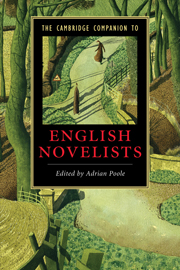Book contents
- Frontmatter
- Introduction
- 1 Daniel Defoe
- 2 Samuel Richardson
- 3 Henry Fielding
- 4 Laurence Sterne
- 5 Frances Burney
- 6 Jane Austen
- 7 Walter Scott
- 8 Charles Dickens
- 9 William Makepeace Thackeray
- 10 Charlotte Brontë
- 11 Emily Brontë
- 12 Elizabeth Gaskell
- 13 Anthony Trollope
- 14 George Eliot
- 15 Thomas Hardy
- 16 Robert Louis Stevenson
- 17 Henry James
- 18 Joseph Conrad
- 19 D. H. Lawrence
- 20 James Joyce
- 21 E. M. Forster
- 22 Virginia Woolf
- 23 Elizabeth Bowen
- 24 Henry Green
- 25 Evelyn Waugh
- 26 Graham Greene
- 27 William Golding
- Guide to further reading
- Index
18 - Joseph Conrad
Published online by Cambridge University Press: 28 March 2010
- Frontmatter
- Introduction
- 1 Daniel Defoe
- 2 Samuel Richardson
- 3 Henry Fielding
- 4 Laurence Sterne
- 5 Frances Burney
- 6 Jane Austen
- 7 Walter Scott
- 8 Charles Dickens
- 9 William Makepeace Thackeray
- 10 Charlotte Brontë
- 11 Emily Brontë
- 12 Elizabeth Gaskell
- 13 Anthony Trollope
- 14 George Eliot
- 15 Thomas Hardy
- 16 Robert Louis Stevenson
- 17 Henry James
- 18 Joseph Conrad
- 19 D. H. Lawrence
- 20 James Joyce
- 21 E. M. Forster
- 22 Virginia Woolf
- 23 Elizabeth Bowen
- 24 Henry Green
- 25 Evelyn Waugh
- 26 Graham Greene
- 27 William Golding
- Guide to further reading
- Index
Summary
Joseph Conrad, the pen-name adopted by Józef Konrad Korzeniowski (1857-1924), earned his early reputation as a writer of colonial fiction. His first two novels, Almayer's Folly (1895) and An Outcast of the Islands (1896), were set in Southeast Asia, and reviewers saw him as annexing a new territory for British fiction. They compared his work, for example, with Louis Becke's (1855-1913) stories of the South Pacific. He was also, perhaps inevitably, termed 'the Kipling of the Malay Archipelago'. And yet, as a colonial story, Almayer's Folly is highly disconcerting. It is very different from the imperialist and masculinist fiction produced by the writers of W. E. Henley's circle (such as Stevenson and Kipling). Andrea White has written illuminatingly about Conrad and adventure fiction, showing how Conrad worked from within the genre of adventure fiction, but, at the same time, 'wrote a fiction at odds with the traditional assumptions of the genre'. As White notes, adventure fiction 'traditionally celebrated an unqualified kind of heroism' and provided 'the energizing myth of English imperialism'. By comparison, Kaspar Almayer is a singularly unheroic hero. In the opening chapter of Almayer's Folly, he thinks back to the start of his career in Macassar and remembers his first impressions of the adventurous Captain Lingard, but his admiration is not for the adventures Lingard has had ('his loves, and . . . his desperate fights with the Sulu pirates'). Lingard has become a 'hero' to him because of 'his smart business transactions' and 'enormous profits'. Like Stevenson's Treasure Island (1883) and Rider Haggard's King Solomon's Mines (1885), Almayer's Folly has a plot involving a search for treasure.
- Type
- Chapter
- Information
- The Cambridge Companion to English Novelists , pp. 290 - 308Publisher: Cambridge University PressPrint publication year: 2009

